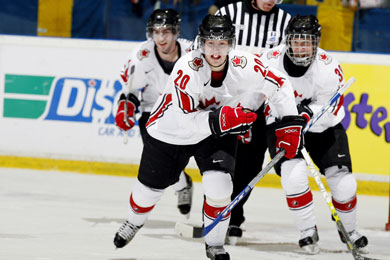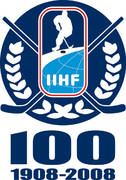Story #91
Czechoslovakia - December 22, 1976
When Canada withdrew from international competition in 1970 to protest its inability to use even semi-pro players in major tournaments, it set off a chain of events that changed the hockey world forever. Out of this protest came the 1972 Summit Series which pitted the Soviet "amateurs" against Canadian NHLers. Such was the success of that eight-game series that a Canada Cup tournament evolved in 1976, permitting the six top nations in the world to play in a tournament using its best players, amateur of pro.
When Canada returned to the World Championships in 1977, it used only NHLers who had been eliminated from the playoffs. In short, during the early years of the 1970s, it was clear that young players and true amateurs were being pushed out of top-flight international competition in favour of pros. As a result, an invitational tournament that began in 1974 received full IIHF status in December 1976. Thus was born the World U20 Championships, an event modeled in the mold of the senior world tournament but limited in participation only to players under 20 years of age.
The early years of the World Juniors (as it is usually called) were difficult as fans and players struggled to embrace a new event held every Christmas. But during the 1980s, the junior championship developed a stronger and stronger presence on the international calendar, especially in Canada where junior hockey is the prime system for developing NHL players.
By the 1990s, the tournament had become an important Christmas and New Year's tradition, and in the early years of the 21st century it had become a major event. It has always attracted the best players in the world from all countries, and virtually every superstar and teenage, world-class player has appeared in at least one tournament, from Vyacheslav Fetisov to Wayne Gretzky to Peter Forsberg. Today, it is an event watched by millions of fans around the world, used by pro scouts as an important benchmark for performance, and has provided spectacular performances from both future greats and players soon to be forgotten.
As part of the IIHF's 100th anniversary celebrations, www.IIHF.com is featuring the 100 top international hockey stories from the past century (1908-2008). Starting now and continuing through the 2008 IIHF World Championships in Canada, we will bring you approximately three stories a week counting down from Number 100 to Number 11.
The Final Top 10 Countdown will be one of the highlights of the IIHF's Centennial Gala Evening in Quebec City on May 17, the day prior to the Gold Medal Game of the 2008 World Championship.
These are the criteria for inclusion on this list: First, the story has to have had a considerable influence on international hockey. Second, it has to have had either a major immediate impact or a long-lasting significance on the game. Third, although it doesn't necessarily have to be about top players, the story does have to pertain to the highest level of play, notably Olympics, World Championships, and the like. The story can be about a single moment — a goal, a great save, a referee's call — or about an historic event of longer duration — a game, series, tournament, or rule change.
|










